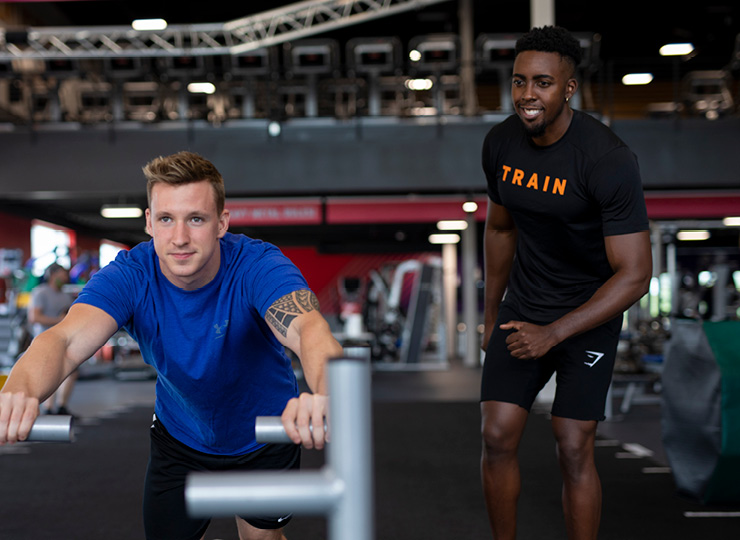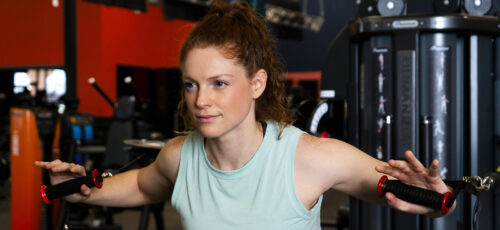
So… Do personal trainers give nutrition advice, or is it solely the domain of nutritionists? In today’s health-conscious society, individuals are increasingly seeking guidance to improve their overall well-being.
Two health and fitness professionals often come to mind when planning to get fit and healthy: personal trainers and nutritionists. While both play pivotal roles in assisting individuals to achieve their wellness goals, they operate within distinct domains, each with unique focus and expertise.
Understanding the roles and differences between these fitness professionals is essential for anyone striving to attain optimal health and fitness. Within the health industry, trainers focus on exercise prescription, motivation, and accountability, while nutritionists specialize in dietary assessment, meal planning, and nutritional advice. However, it’s worth noting that personal trainers may offer basic nutrition tips as part of their services. Still, they need more depth of knowledge and expertise in nutrition that comes with a nutrition certification or a background in registered dietitian training.
Individuals may benefit from consulting a registered dietitian or nutritionist when addressing complex dietary issues or medical nutritional therapy. By using reliable nutrition advice and understanding the importance of both exercise and nutrition in achieving fitness goals, individuals can develop healthier habits and create a more empowering approach to their wellness journey.

Understanding Personal Trainers
These fitness professionals, commonly known as personal trainers, are dedicated experts in designing and implementing exercise programs tailored to their clients’ unique needs and aspirations.
They have extensive knowledge of various exercise modalities, from strength training to cardiovascular workouts and flexibility exercises. A personal trainer endeavors to enhance their clients’ physical fitness, strength, endurance, and overall health through personalized personal training and sessions.
Beyond simply prescribing exercise routines, trainers also fulfill roles as motivators, educators, and accountability partners for their clients. They offer guidance on proper exercise techniques, track progress, and encourage individuals to remain committed to their fitness journey. Moreover, trainers may integrate elements of nutrition education into their sessions to complement their clients’ exercise regimens.
In addition to their exercise physiology and biomechanics expertise, many personal trainers recognize the importance of incorporating practical nutrition coaching skills into their practice.
While personal trainers may not hold formal nutrition certifications or offer medical, nutritional therapy, they can offer reliable nutrition advice and provide valuable guidance on adopting a healthy lifestyle and making informed dietary choices. Some trainers may even demonstrate food preparation skills or offer proven nutrition coaching strategies to support their clients’ wellness goals.
Clients working with personal trainers can typically expect to receive general nutrition advice and encouragement to adopt healthier habits as part of their overall fitness plan. However, consulting with qualified health professionals such as nutritionists is advisable for individuals with specific dietary concerns or medical conditions requiring specialized nutritional interventions. By integrating effective nutrition coaching into their services, trainers can empower their clients to achieve more tremendous success in reaching their health and fitness objectives while fostering long-term adherence to a healthy lifestyle.
The Difference Between a Nutritionist and a Personal Trainer
While personal trainers primarily focus on exercise and physical fitness, dietitians specialize in food science and its profound impact on health. These professionals possess expertise in dietary assessment, meal planning, nutritional counseling, and behavior change strategies.
Working closely with individuals, dietitians evaluate their eating habits, identify areas for improvement, and develop customized nutrition plans to support their health and wellness goals.
While trainers may offer general guidance on healthy eating habits, dietitians possess a more comprehensive understanding of nutrition science, encompassing macronutrients, micronutrients, dietary guidelines, and food composition. With their extensive nutrition certifications and training programs, they can provide tailored recommendations based on an individual’s specific nutritional needs, preferences, and goals.
Registered dietitians address various nutrition-related issues, including weight management, sports nutrition, chronic disease prevention, and specialized dietary interventions for conditions such as diabetes, hypertension, and food allergies.
Through effective coaching skills and evidence-based mentoring, they empower individuals to make informed food choices, develop healthier eating patterns, and adopt sustainable lifestyle habits that promote long-term health and well-being.
In contrast to personal trainers who primarily offer exercise guidance, a certified nutrition coach provides comprehensive counseling to improve overall health and relieve disease symptoms through dietary interventions.
By collaborating with other health professionals, including medical doctors and allied health practitioners, they play a crucial role in promoting holistic health and wellness. Their expertise in nutrition science, combined with their ability to provide personalized meal plans and lifestyle advice, makes them invaluable assets in the health and fitness industry.

Limits on Food Advice
It’s essential to acknowledge that while some personal trainers may incorporate basic nutritional guidance into their services, it’s important to remember that not all personal trainers are qualified to provide in-depth nutrition counseling or medical nutrition therapy for medical and clinical conditions. This distinction is crucial to avoid any potential assumptions about their scope of practice. Additionally, some trainers may possess certified nutritional qualifications alongside their personal training certifications, allowing them to offer a more comprehensive approach.
Personal trainers can certainly encourage clients to adopt healthy eating habits, emphasizing the importance of consuming whole foods, incorporating healthy fats, and prioritizing protein sources. Moreover, they may educate clients on nutrition basics, including the benefits of proper nutrition for overall health and wellness.
However, when it comes to addressing complex dietary issues or medical conditions, such as managing diabetes or food allergies, consulting a registered dietitian or nutritionist is imperative.
These professionals possess the expertise to conduct thorough nutrition assessments, develop personalized meal plans, and offer evidence-based nutrition tips tailored to individual needs. Additionally, expert dietitians can provide guidance on stress management strategies and lifestyle choices that support optimal health.
Why Food Experts Are Helpful
While personal trainers undoubtedly play a crucial role in promoting physical activity and exercise adherence within their scope of practice, integrating nutrition education into their programs can significantly enhance the overall effectiveness of their services. By collaborating with expert dietitians or nutrition experts who possess effective nutrition coaching skills, trainers can provide comprehensive support that addresses both exercise and dietary needs, leading to improved outcomes for their clients. To know if you and your trainer are right fit for each other or not, schedule a CrunchONE Kickoff at Crunch today!
Registered dietitians, with their proven nutrition coaching and fitness certifications, offer valuable insights and guidance on optimizing nutrition to support exercise performance, enhance recovery, and achieve specific fitness goals.
They can educate individuals on proper fueling before and after workouts, hydration strategies, and nutrient timing for optimal results. Additionally, they can provide personalized nutritional interventions tailored to individual needs and goals, including those with medical or clinical illnesses.
Trainers can leverage their nutrition knowledge to educate clients on the importance of incorporating lean protein sources, healthy fats, and whole grains into their diets. Moreover, trainers can demonstrate food prep skills and offer practical tips to facilitate meal planning and adherence to dietary recommendations.
By understanding the role of nutrition in achieving their fitness goals, individuals can adopt sustainable lifestyle changes that contribute to long-term health and well-being. However, trainers need to recognize the limitations of their scope of practice and refrain from diagnosing health problems or offering medical nutritional therapy beyond their expertise. Instead, they can collaborate with dietitians, physical therapists, and other healthcare professionals to ensure comprehensive care for their clients’ overall well-being.
Getting Fit is Not Just Working Out
In conclusion, personal trainers and nutritionists are integral in helping individuals achieve their health and fitness goals. While personal trainers focus on exercise prescription, motivation, and accountability, nutritionists specialize in dietary assessment, meal planning, and nutritional counseling. They can even relieve disease symptoms overlooked by us or our trainers.
By understanding the distinctions between these professionals and recognizing the value of their expertise, individuals can take a holistic approach to their wellness journey, integrating both exercise and nutrition for optimal results. Remember, getting fit is not just about working out, it’s about nourishing your body one bite at a time.
Join Us!
Crunch prioritizes personalized training, right nutritional help and unwavering support, empowering individuals to reach their fitness goals. Their dedicated staff focuses on motivation and expert guidance to maximize personal training results. Crunch promotes a culture of positivity, inclusivity, and fun with no judgments by providing an environment for all individuals regardless of their health and fitness goals. Find a Crunch gym near you to try our free trial membership, or join Crunch now. We’re here for you – at the gym or at home. Access the best live & on-demand workouts anytime, anywhere with Crunch+. Ready to get sweaty? Try hundreds of workouts for free! Start your free trial now!















































































